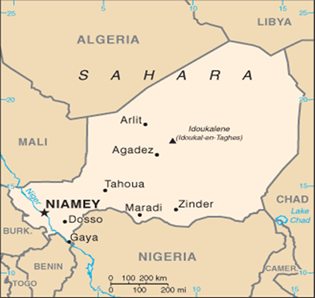Blog
Political Instability and Niger's Biggest Problem
First published in Pearls and Irritations, 23 August 2023
Paul Collins
 Niger and its neighbours (Source: Wikipedia)
Niger and its neighbours (Source: Wikipedia)West Africa is emerging as a highly unstable region and massive over-population is at the heart of the problem.
Until 1960 Niger was part of French West Africa and is now the largest country in the region. Named for the Niger River which rises in the Loma Mountains in Sierra Leone, it flows through the country named for it, eventually reaching the Atlantic at the Gulf of Guinea. Niger is about the same size as France.
The country’s political history since independence has been volatile with military coups, interspersed with civilian governments. Since 2010 the country has been stable politically, despite two failed military coups. Current President, Mohamed Bazoum, was democratically elected in April 2021. However, he was overthrown by a coup by the presidential guard on July 26, 2023.
Most of Niger is situated in the Sahel region, the transition zone between the Sahara Desert to the north and the more fertile savanna and tropical regions to the south. Parts of Niger are beautiful, especially the Aïr Mountains north of Agadez in the heart of Tuareg territory, a Sahara-dwelling Berber people.
Niger’s political instability flows directly from its economic and social challenges. With about 7% of the world’s supply, the country’s main export is high-grade uranium, making-up a large percentage of Niger’s foreign trade. This is controlled by the French-owned Orano Group. There are claims that mining operations are leading to environmental health problems that are impacting local children exposed to radiation. In fact, the country is gaining little from its uranium exports.
But Niger’s biggest problem is over-population. With about 3.5 million people in 1960, Niger’s population was 27 million in mid-2023. It’s fertility rate of 6.95 children per women is the highest in the world. UN estimates have the population reaching around 60 million or more by 2050, a totally unsustainable number. Contraceptives are freely available, but usage is low and with a median age of fifteen, the prognosis for effective population control is minimal.
Ninety-five per cent of the population live a poor, rural lifestyle on the one third of arable and semi-arable land in the south, where the capital Niamey is situated (current population is 1.4 million, up from 24,350 in 1950). Niger suffers from recurrent natural crises, especially droughts and locust infestations. The soil is superficial and low in nutrients and overgrazing is common. The situation being further degraded by climate change which is contracting the productive area of the country.
Niger is the world’s poorest country according the UN’s 2018 Human Development Index, a tool that measures life expectancy, education and per capita income. The per capita annual income is about US$420, with 60% of the population living on less than a dollar a day, with a life expectancy of 60.4 years. Neighbouring countries have even lower life expectancies. Chad is 52.9 years, Nigeria 53.4 and Mali 57.9.
Social, religious and family dynamics means that Nigerien women and girls lack the freedom to control childbearing. More than half of girls are married before they are fifteen and many eighteen-year-olds already have four or five children. Polygamy is legal and common with many men having multiple wives.
There is enormous social pressure on women from husbands, families and in-laws to have more children because fertility is seen as a sign of wealth and power. Mortality among women is high with a one-in-twenty-three chance of dying from pregnancy or childbirth. Girls don’t get the opportunity to finish primary school with an 11% literacy rate for females; the general adult literacy rate is 19%, the second lowest in the world. Only one in five children enter secondary school.
The key population problem is persuading and educating both men and women to have fewer children and then providing the means to limit family size. Decisions about a woman’s fertility are often made by their husbands, so both sexes have to be persuaded to limit fertility. In this context family planning is not so much about preventing pregnancy, as trying to make space between children to give women a chance to recover and care for the children they already have.
The country is not only politically unstable, but strategically as well. The whole western Sahel region is unpredictable which has led to increasing great power intervention by American and French special forces. Boko Haram, an al-Qaeda off-shoot is active on Niger’s border with Nigeria, as well as in Burkina-Faso and Mali. Former Gaddafi loyalists from Libya are active in the northern Sahara region, leading to widespread brigandage. The regional instability led to a military coup in Mali in 2020 and in 2022 in Burkina Faso.
Have the coups improved things? No, according to the BBC. “In both countries, attacks by Islamist militants on civilians have only increased. The same is true of civilian deaths - more ordinary people are being killed by Islamists, militants and the military” (BBC News, July 30, 2022). The same prognosis applies in Niger.
While the Niger coup leaders want the French and Americans out, have they invited Wagner mercenaries in? Again, no, according to BBC Verify. As of August 9, 2023 there were no Wagner mercenaries in Niger according to the BBC. That’s something, I suppose.
I’ve written in detail about Niger’s population problems in my The Depopulation Imperative. How many people can Earth support? (North Melbourne, Australian Scholarly, 2021).
Care to comment? .